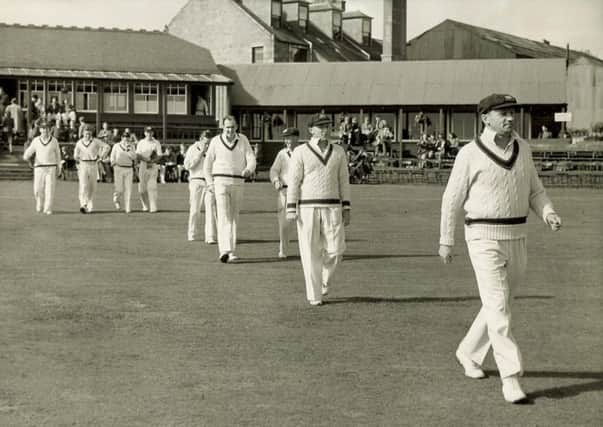The day Aberdeen hailed Bradman '“ the greatest Don of them all


The occasion was a two-day game against Scotland, the last of a 34-match “Ashes Tour” during which Bradman’s men swept all before them, earning the nickname of “The Invincibles”. Had The Don been able to choose, doubtless he would have preferred to record that century at the final Ashes Test at the Oval a few weeks earlier where, instead, he had to endure the ignominy of being out for a duck, second ball to Warwickshire’s Eric Hollies. Needing only four runs to complete an unprecedented Test average of 100 runs, Bradman was cruelly left dangling on an average of 99.94.
By the time he and his all conquering team reached Aberdeen, any disappointment had been cast aside. His master class of batting in the Granite City on the Saturday captivated the crowd, with one report suggesting that “every stroke was cheered to the echo”. He himself remarked, “As a spectacle, it must have been my best effort on the trip”. He reached 50 in half an hour including six fours in his first 28 runs, his century in 80 minutes and added 23 runs in ten minutes before declaring. Those final runs included two consecutive sixes off Kelburne’s Willie Nichol, who’d had had the temerity to take The Don’s wicket for 27 in the match between the countries earlier that week at the Grange in Edinburgh.
Advertisement
Hide AdAdvertisement
Hide AdNichol was a Paisley newsagent and ex-professional footballer for St Mirren among others. Scotland had made a decent start, reaching 156 for five, with former Hearts goalkeeper and Carlton batsman Tom Crosskey notching 49 but the last five wickets fell for 22.
Edinburgh Academy teacher Guy Willatt did well to score 52 in the hosts’ second innings while the visitors’ fielding was described as “a delight to watch”. The first day’s crowd of 8,000 was surpassed on the Saturday when 10,000 attended, Aberdeenshire Cricket Club having had the foresight to instal extra seating. Cricket fever had infected the Granite City, additional trams and buses being laid on to ferry spectators. Alastair Garvie who as an eight-year-old was taken by his father remembers being “overwhelmed” by the size of the crowd. “Buff” Hardie, a member of Scotland the What trio, recalled being there aged 17 and how Bradman’s batting “stole the show”. He also recalled the fine bowling of Aberdeenshire’s George Youngson, who took three for 114.
Although the Aberdeen fixture was not first-class status, Bradman was determined to maintain his team’s unbeaten record, irrespective of how unlikely a home win was. His pursuit of success had been relentless on the Tour and his hardline tactics had come in for some criticism. Team-mate Keith Miller, the famous all rounder, was quoted regarding his captain’s instructions about the opposition early in the tour: “Nail them into the ground when you get in front. Never let them get up.”
Despite his ruthlessness, Bradman was the centre of attention wherever he went. During an hour’s stroll in Aberdeen he was stopped more than 20 times for autographs and commented: “Folk will say that’s a compliment but try it yourself for 20 years and see what it does to your nervous system.”
After their convincing win in Edinburgh the tourists had relaxed with golf at Bruntsfield before heading north by train to book into the city’s Caledonian Hotel where Bradman immediately went to bed to rest. This underlined the seriousness of his approach to Aberdeen’s biggest cricket occasion in 75 years – since WG Grace and his South of England team had played the North Eastern Counties of Scotland in 1873.
After their comfortable win, the Australians praised their hosts for the state of their wicket and match arrangements while the Scottish Cricket Union presented Bradman with the ball used in his innings mounted with a commemorative inscription.
On the Sunday both teams were invited to meet the Royal Family at Balmoral, where the tourists were particularly enthused by the warmth of welcome. They loved the informality of the occasion and their hosts’ genuine interest in cricket. The tourists’ bagman/scorer Bill Ferguson was overcome that the King took time to speak to him, asking if he needed an adding machine for Bradman’s runs. One sour note was the publication of a photo of Bradman speaking to the King with his hands in his pockets for which he was criticised but clearly George VI thought nothing of it, awarding him a knighthood months later.
Bradman, on leaving Tilbury to sail home on the Orontes, later wrote: “As I watched the pier gradually recede, I felt here was the end of a mission – without doubt it had been the grandest tour of all.”